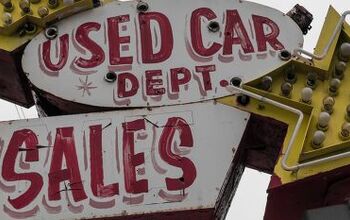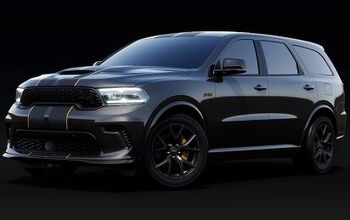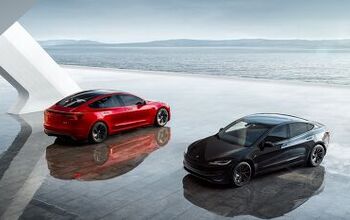Volkswagen Figures It Can Keep Its Favorite Platform Around Basically Forever

In automotive terms, Volkswagen’s go-to MQB platform might end up having a lifespan somewhere between a Fox and a Panther.
Eager to stretch its meager dollars to Gumby-like proportions, the embattled automaker has announced that the platform underpinning most of its vehicles won’t die after two generations. Nah, let’s make it three, VW brand chief Herbert Diess said.
That means some vehicles, such as the stalwart Golf, will eventually ride on a platform old enough to drink in the United States.
According to Reuters, Diess told the German newspaper Boersen-Zeitung that keeping the MQB platform around for a little while longer — okay, a lot — should rake in the savings the company so desperately craves.
“In the past months we have worked on the cost side of MQB and made significant progress,” Diess said. “The MQB has high technical substance, so we can use it for the next two vehicle generations without further major investments.”
The modular platform, first used on the 2012 Golf, provides the backbone for VW’s small and midsize cars, crossovers and SUVs. The architecture also finds a home in some Audi small cars, as well as other VW Group products. Diess has said before that the MQB platform is a little too hoity toity for a volume compact like the Golf, hence the need to trim the expense.
Actually, there’s a laundry list of reasons why the automaker hit snooze on the MQB’s replacement. Volkswagen has promised to shave billions in expenses over the next few years as the company faces pressure on two fronts — paying off a Mt. Everest-sized pile of fines, settlements and litigation stemming from the diesel emissions scandal (the current tally stands at $16.5 billion in the U.S. alone), plus bringing to market a promised crop of electric vehicles.
Short of clipping coupons for Shake n’ Bake, cutting platform costs and building more utility vehicles is VW’s only fallback.
Speaking of the Golf, a refreshed version should appear any day now. The seventh generation model should soldier on in a lightly updated form for another few years.
[Image: Volkswagen of America]

More by Steph Willems
Latest Car Reviews
Read moreLatest Product Reviews
Read moreRecent Comments
- Tassos Under incompetent, affirmative action hire Mary Barra, GM has been shooting itself in the foot on a daily basis.Whether the Malibu cancellation has been one of these shootings is NOT obvious at all.GM should be run as a PROFITABLE BUSINESS and NOT as an outfit that satisfies everybody and his mother in law's pet preferences.IF the Malibu was UNPROFITABLE, it SHOULD be canceled.More generally, if its SEGMENT is Unprofitable, and HALF the makers cancel their midsize sedans, not only will it lead to the SURVIVAL OF THE FITTEST ones, but the survivors will obviously be more profitable if the LOSERS were kept being produced and the SMALL PIE of midsize sedans would yield slim pickings for every participant.SO NO, I APPROVE of the demise of the unprofitable Malibu, and hope Nissan does the same to the Altima, Hyundai with the SOnata, Mazda with the Mazda 6, and as many others as it takes to make the REMAINING players, like the Excellent, sporty Accord and the Bulletproof Reliable, cheap to maintain CAMRY, more profitable and affordable.
- GregLocock Car companies can only really sell cars that people who are new car buyers will pay a profitable price for. As it turns out fewer and fewer new car buyers want sedans. Large sedans can be nice to drive, certainly, but the number of new car buyers (the only ones that matter in this discussion) are prepared to sacrifice steering and handling for more obvious things like passenger and cargo space, or even some attempt at off roading. We know US new car buyers don't really care about handling because they fell for FWD in large cars.
- Slavuta Why is everybody sweating? Like sedans? - go buy one. Better - 2. Let CRV/RAV rust on the dealer lot. I have 3 sedans on the driveway. My neighbor - 2. Neighbors on each of our other side - 8 SUVs.
- Theflyersfan With sedans, especially, I wonder how many of those sales are to rental fleets. With the exception of the Civic and Accord, there are still rows of sedans mixed in with the RAV4s at every airport rental lot. I doubt the breakdown in sales is publicly published, so who knows... GM isn't out of the sedan business - Cadillac exists and I can't believe I'm typing this but they are actually decent - and I think they are making a huge mistake, especially if there's an extended oil price hike (cough...Iran...cough) and people want smaller and hybrids. But if one is only tied to the quarterly shareholder reports and not trends and the big picture, bad decisions like this get made.
- Wjtinfwb Not proud of what Stellantis is rolling out?


































Comments
Join the conversation
It is only people who post here that worry about changes in suspension geometry. This is not rocket science, Surely, this all should have been worked out years ago. Only budgets prevents finessing the platforms.
I've heard this before - all complaints about an OEM keeping a platform around longer than some like. So what? On the surface, I see nothing but good reasons to keep an older platform around if it is a good one. That way, I assume continual improvements can be made to keep it current, thus making a car more reliable rather than constantly re-inventing the wheel, so to speak, as stated above.